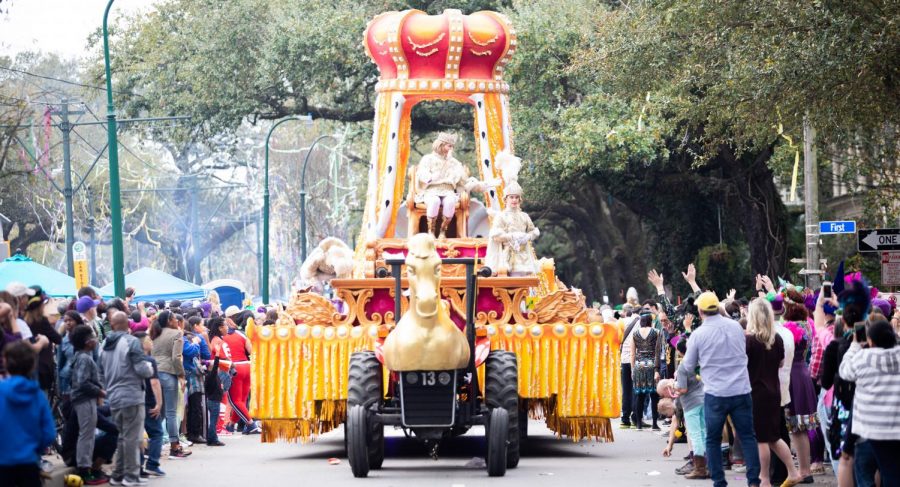Editorial: Blaming New Orleans is easy, but wrong
Rex, King of Carnival, greets parade-goers on St. Charles Ave. The first confirmed case of COVID-19 in Louisiana was two weeks after Fat Tuesday. Photo credit: Michael Bauer
April 21, 2020
You’ve probably noticed New Orleans in the news cycle a lot recently, and for an obvious reason. The Crescent City has been one of the worst affected cities in the country by COVID-19.
CNN, CBS and other news outlets have been grilling Mayor LaToya Cantrell and Gov. John Bel Edwards for not having the foresight to cancel Mardi Gras. And seemingly all of Twitter and Facebook were ready to jump on the bandwagon, blaming the city for throwing a week-long party in the midst of a pandemic.
Political columnist Meghan McCain told Cantrell on “The View ” that she was “surprised the Mardi Gras celebrations continued” in February. CNN anchor Jake Tapper asked Edwards if he regretted not cancelling Mardi Gras. One CNN reporter even cited our own reporting on Twitter to criticize the city, calling not cancelling Mardi Gras “a controversial decision at the time.”
But this blaming is a false narrative.
Carnival season kicked off on Jan. 6 this year, a whole week before a case of COVID-19 outside of China was even reported. So unless Mayor Cantrell had just gotten the city’s fortune read by a psychic in the French Quarter before Chewbacchus rolled out, expecting her to have the premonition to anticipate a pandemic in New Orleans is ridiculous.
On Feb. 19, Druids and Nyx, the first Uptown parades started rolling out, and on Feb. 25, Mardi Gras ended on Fat Tuesday.
Meanwhile, malls, zoos and museums were still seeing thousands of guests every day across the country. Disney and Six Flags theme parks still had wall-to-wall lines for all their rides and attractions, and were still overcharging families for churros. Millions of voters headed to the polls to vote on Super Tuesday, and thousands more were still going to rallies for presidential candidates Bernie Sanders, Joe Biden, Donald Trump and all of the other Democratic nominees who hadn’t yet dropped out.
And almost two weeks after Mardi Gras ended on March 9, the first presumptive case of COVID-19 was confirmed in Louisiana in New Orleans.
The NBA, MLS and NHL seasons were suspended two days later on March 11, a full two weeks after Mardi Gras ended. That’s two weeks of tens of thousands of screaming sports fans packed into arenas and stadiums across the country every single day.
Yet, there is a glaring lack of a public outcry against NBA Commissioner Adam Silver or NHL Commissioner Gary Bettman for lacking the foresight to shut down their seasons sooner, for an obvious reason. They couldn’t have been expected to have the foresight to see what kind of pandemic COVID-19 would turn into at the time.
So why is Mardi Gras, and to a larger extent, the city of New Orleans, being singled out by these social media pundits and television talk-show heads for lacking this foresight of what COVID-19 would eventually become?
Maybe because it’s such an easy target.
It’s easy to look at a city with one of the highest infection rates in the country, and point to a large gathering that city hosted weeks before any confirmed cases in the state, and put two-and-two together retroactively.
But, again, that’s a false narrative.
The CDC said that cancelling Mardi Gras was never even on the table at the time. If the leading medical experts at the time never recommended cancelling Mardi Gras, how can the city be to blame for still hosting carnival season? Our local leaders were just following the guidelines laid out for them every step of the way.
And our federal government’s leaders not taking this threat seriously enough didn’t help matters on the local level either.
President Donald Trump even tweeted almost two weeks after Mardi Gras ended, “So last year 37,000 Americans died from the common Flu. It averages between 27,000 and 70,000 per year. Nothing is shut down, life & the economy go on. At this moment there are 546 confirmed cases of CoronaVirus, with 22 deaths. Think about that!”
But under the right guidelines, the city’s officials have taken the right steps in choosing safety over fun. And we saw that in how Catrell, unpopularly at the time, cancelled all St. Patrick’s Day festivities on March 10, a full four days before even Disneyland closed down.
The pandemic spread of COVID-19 was accelerated in the United States by gatherings, sports events, rallies and amusement parks across the country for weeks after Mardi Gras, so maybe the blame lies not in how one particular city handled one particular social event, but on federal leaders for not doing enough to prevent this accelerated spread in the first place.
New Orleans is struggling right now to find answers to a growing number of new cases and new deaths every day. The growing number of confirmed case rates are outpacing the number of available ICU beds and ventilators in the city, and the city is desperately looking for answers.
The Crescent City has unfortunately become the victim of federal neglect, just as it did in 2005 after Hurricane Katrina. But this time, the city is fighting against a lack of resources in a health crisis — as well as false narratives, victim blaming and revisionist history.









Patty • Apr 29, 2020 at 6:19 pm
I think this is a well written defense of Mardi Gras getting the green light. JC laid out the facts & timeline so well that the decision seemed reasonable at the time. Great reporting! I’m a Loyola alum & happy to see the Maroon still has excellent talent!
B E Trager • Apr 22, 2020 at 4:21 pm
We are a strong and resilient people, strong enough to carry the burden when we’re wrong, and resilient enough to grow from the consequences, but that being said, we shouldn’t have to suffer when the truth is being told! Wake up people, it’s time to stop playing the “blame game” and get on with helping our neighbors recover!
Claire D • Apr 22, 2020 at 3:45 pm
Great article, JC! It’s so important to call out the hypocrisy of people who are blaming New Orleans for not shutting down Mardi Gras while they were at Disney World and going to sports game and taking spring break vacations at the exact same time. Hopefully people will stop blaming New Orleans and being hypocritical.
Denise Mostowfi • Apr 22, 2020 at 2:49 pm
Nicely written article, JC! Great points regarding the timeline for Mardi Gras as compared to other large events – thank you!
John Quigley • Apr 22, 2020 at 8:51 am
I thought JC Canicosa did a very good job in writing this editorial. Certainly cleared up some misconceptions I had about Covid-19 in New Orleans. Thanks for getting this out.
E M J • Apr 21, 2020 at 11:46 pm
Mari Grass shouldn’t have went on, all the city cares about is making money. Several people died during this evevt, don’t care, a building fell down, didn’t care, murder rate up, still don’t care. Guess what I was born there.